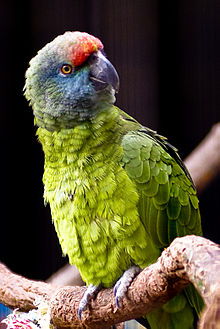| Festive amazon | |
|---|---|

| |
| A. f. bodini | |
| Conservation status | |
 Least Concern (IUCN 3.1) | |
| Scientific classification | |
| Domain: | Eukaryota |
| Kingdom: | Animalia |
| Phylum: | Chordata |
| Class: | Aves |
| Order: | Psittaciformes |
| Family: | Psittacidae |
| Genus: | Amazona |
| Species: | A. festiva |
| Binomial name | |
| Amazona festiva (Linnaeus, 1758) | |
| Synonyms | |
| |
The festive amazon (Amazona festiva), also known as the festive parrot, is a species of parrot in the family Psittacidae. It is found in Brazil, Colombia, Ecuador, Bolivia, Guyana, Peru, and Venezuela. It is associated with forest (especially Várzea) and woodland growing near major rivers. Locally, it is also found in coastal mangroves (primarily in Amapá). There are two subspecies; A. f. festiva and A. f. bodini.
Taxonomy
The festive amazon was formally described in 1758 by the Swedish naturalist Carl Linnaeus, in the tenth edition of his Systema Naturae. He placed it with all the other parrots in the genus Psittacus and coined the binomial name Psittacus festivus. Linnaeus mistakenly specified the type location as "Indies". It was later designated as the Amazon River in Brazil. The festive amazon is now one of around thirty species placed in the genus Amazona that was introduced by the French naturalist René Lesson in 1830. The genus name is a Latinized version of the name Amazone used in the 18th century by the Comte de Buffon. The specific epithet festivus is Latin for "festive" or "cheerful".
Two subspecies are recognised:
- A. f. bodini (Finsch, 1873) – east Colombia, east Venezuela, Guyana
- A. f. festiva (Linnaeus, 1758) – west Amazonia
Description
The subspecies bodini has more red to the forecrown and more blue to the face than the nominate. In flight, both subspecies show deep blue outer wings (outer webs of the primaries and the primary coverts) and a red rump, but the latter is reduced in juveniles.
Distribution and habitat
The nominate subspecies is found near rivers in the Amazon Basin, while the subspecies bodini, is found near the Orinoco River.
Status
Although it has declined locally, it remains fairly common throughout a large part of its range and can even be seen near cities such as Manaus and Iquitos. Consequently, it was considered to be of least concern by BirdLife International and IUCN, though it was uplisted to vulnerable in 2012, due to models of deforestation in the Amazon Rainforest and its susceptibility to hunting, which predicts that the population will decline rapidly over the next three generations.
Gallery
-
 Amazona f. festiva
Amazona f. festiva
-
 A. f. festiva in the Amazon Jungle
A. f. festiva in the Amazon Jungle
-
At Loro Park.
-
 A. f. bodini adults have a red back
A. f. bodini adults have a red back
-
 A. f. bodini in an aviary
A. f. bodini in an aviary
References
- BirdLife International (2022). "Amazona festiva". IUCN Red List of Threatened Species. 2022: e.T22727626A209890756. Retrieved 22 July 2022.
- Linnaeus, Carl (1758). Systema Naturae per regna tria naturae, secundum classes, ordines, genera, species, cum characteribus, differentiis, synonymis, locis (in Latin). Vol. 1 (10th ed.). Holmiae (Stockholm): Laurentii Salvii. p. 101.
- Peters, James Lee, ed. (1937). Check-List of Birds of the World. Vol. 3. Cambridge, Massachusetts: Harvard University Press. p. 220.
- Lesson, René (1831). Traité d'Ornithologie, ou Tableau Méthodique (in French). Vol. 1. Paris: F.G. Levrault. p. 189.
- ^ Gill, Frank; Donsker, David; Rasmussen, Pamela, eds. (January 2022). "Parrots, cockatoos". IOC World Bird List Version 12.1. International Ornithologists' Union. Retrieved 19 March 2022.
- Jobling, James A. (2010). The Helm Dictionary of Scientific Bird Names. London: Christopher Helm. pp. 44, 159. ISBN 978-1-4081-2501-4.
| Taxon identifiers | |
|---|---|
| Amazona festiva |
|
| Psittacus festivus | |
This article relating to parrots is a stub. You can help Misplaced Pages by expanding it. |